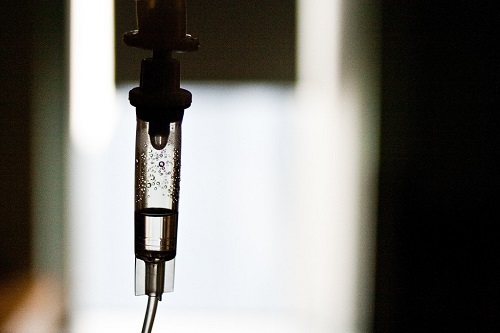Allan Foster photo
By
Sherry Shahan
When she was wheeled into the day room, attended by her IV drip, Jack thought she was the most beautiful girl he had ever seen. She seemed absolutely pure, evacuated of all evil, honed to perfection. Her head was an imported melon covered by the finest filo pastry, stretched and rolled thin. Her cheeks were eggshells. Concave. The hair on her head was shredded coconut. The hair on her body was dark and fuzzy, like the mold on Gorgonzola. Her skin was the color of Dijon mustard – that wonderful brownish tinge that comes from lost vitamins and minerals. She was everything gourmet Jack had denied himself.
According to the nurse, her name was Iris and this was her eighth admission in three years – her parents checked her in, she put on some weight, she went home, she lost it. This time, she’d done a two-month fast and then eaten a carton of laxatives. Jack was impressed, he felt encouraged; apparently, it was possible to go through the program without being totally brainwashed.
When Iris looked at Jack, she wondered what he was doing on the ward. Not exactly no-boys-allowed, but he was the first male anorexic she’d ever seen.
When Jack looked at Iris, he couldn’t help but imagine what life would be like in their own tenth-floor apartment, no elevator. Living room with bar bells, rubber balls, wrist weights with Velcro strips. Medicine cabinet with over-the-counter laxatives (chocolate squares, capsules, herbal mixtures). Diuretics in timed released tablets. Digital scales, fine-tuned to a quarter-ounce. Disposable enema bags. No kitchen. Ultimate control over their bodies.
Iris smiled at him; her T-shirt said YOU ARE WHAT YOU EAT.
“Everyone’s on a diet,” she said softly, “and all they do is gain weight.”
Jack nodded.
“The nurses are jealous of my figure,” she continued. “Most people are. Even Dr. Chu. Why do you think he started this program?”
Jack couldn’t think of any other reason.
“They won’t be happy until everyone on this unit looks like the Pillsbury Dough Boy.”
Jack sighed.
After dinner, Jack opened and closed the metal chairs 350 times before stacking them against the wall. Then he focused on questions to ask his nutritionist: How much does the average toenail clipping weigh? How many calories do you burn clipping them? What happens to the saliva I swallow?
Therapy filled the following days:
Occupational.
Individual.
Group.
Movement.
Art.
Plus lectures. “The issue isn’t food,” Dr. Chu droned on. “It’s about seeking perfection in an imperfect world.”
Dr. Chu gave Jack permission to join a few patients on 20-minute walks around the hospital grounds. Monitored, of course, by the physical therapist who made sure no one jogged.
Jack stared at his lunch: a sandwich (with crust), an apple (with skin), and a lettuce salad with a little packet of oily dressing. He portioned his sandwich with a knife and fork, careful not to touch the bread in case calories could be absorbed through his skin – the reason he’d never used shaving cream or aftershave.
He tried not to look surprised when Iris asked the nurse for a bullion cube. “This potato doesn’t have any flavor,” she said. “May I have a cup of hot water, too, please?”
Bullion sloshed over the potato melting the excess butter. Iris ate the potato and left her floating butter. The nurse didn’t make her drink the bullion because it wasn’t on her menu.
At dinner, Iris used her finger to wipe a pat of butter on an asparagus spear, then suck an adjacent finger, pretending to remove the excess butter. The buttered finger scratched an ankle and the calories were absorbed by a yellow sock.
Iris gave up her wheelchair on the eleventh day.
Iris and Jack shared secrets. Jack told her how he’d stayed up the night before the weekly weigh-in drinking gallons of water so the scales would show an increase in weight, which he’d pee away later. Iris told how she’d smuggled fishing weights onto the ward and sewed them into the hem of her hospital gown. “As long as the scales show a weight gain,” she said, “we have an argument against the doctor raising our calories.”
After lights out, sometimes at two, sometimes three or four, depending on the schedule of the night nurse, Jack sat on Iris’s hummingbird feet while she did sit-ups. She rode his bony spine while he sweated out push-ups.
“Was it good for you?” he’d ask afterwards, collapsing from exhaustion.
The next weigh-in showed that Jack had not put on the required weight. Dr. Chu summoned Jack into his office “to chew the fat.”
“We monitor your weight very carefully,” he said.
(It’s our job to make sure you gain as much weight as possible while you’re here.)
“Did you hear me, son?”
“Uh-huh.”
“We can’t let you go home until your weight stabilizes.”
(You’re a prisoner until you gain a thousand pounds.)
“Do you understand, son?”
“Uh-huh.”
“Since your chart indicates no weight gain, even after we’ve raised your calories another 200 per day, the staff can only conclude you’ve been exercising after hours.”
(We have closed circuit cameras and hidden microphones in your bedroom.)
“Are you listening to me, son?”
“Uh-huh.”
Jack found Iris in the day room playing solo scrabble. Four ‘S’s spelled slim, slender, slight and svelte.
Iris smiled at him. “I got emaciated on a triple-word score!”
“They’re on to us,” Jack said, sitting beside her. “Guess all that water before weigh-in didn’t make up for exercising.”
“Salt pills. Then we’ll retain more water.”
“Tomorrow’s my mom’s birthday and I have a two-hour pass,” he said. “I’ll buy some.”
“Wrap them in a tissue,” Iris said, “and put it under your arm. Nurses never check armpits.”
Jack savored these conversations with Iris; he relished them.
Sandy and another bulimic strolled by sucking orange wedges.
“Quitters,” Jack murmured.
“No will-power,” Iris whispered back.
Before visiting his family, Jack stopped at a drug store and bought a packet of salt tablets.
A display of boxed chocolates by the register gave him an idea. He headed to the Home Remedy aisle and grabbed a carton of laxatives, then paid for a small paintbrush and the latest copy of Weight Watchers.
He set the laxatives on his dashboard during his mom’s birthday party. They were a melted mess by the time he returned to the hospital. In the parking lot, he used the brush to paint the pages of the magazine with laxative. Then he checked in at the front desk. Pockets were turned inside out. Shoes shaken. Cuffs unrolled. Frisked, like a felon. Thankfully, the salt tablets didn’t drop. Sweat kept the tissue in place. No one questioned the magazine.
“Have you seen Iris?” he asked the nurse.
“Took her to ICU an hour ago.”
His heart slipped. “Is she okay?”
“Her resting pulse shot up to 250 beats per minute,” the nurse said. “That girl’s a cardiac arrest looking for a place to happen.”
Jack didn’t bother to ask if Iris could have visitors. He knew the answer. He also knew the hospital layout better than most of the staff, since he used to jog the halls late at night.
He found her in Room 602. She wasn’t under an oxygen tent. Good sign. She had an IV. drip and a heart monitor. Her eyelids fluttered lightly.
“Iris?” he whispered, moving closer.
“Jack?” Her voice was thin as angel hair pasta.
He held a limp hand. “How’re you feeling?”
“How do I look?” she asked, eyes still closed.
“Like a delicately carved skeleton,” he said.
She smiled. “Come closer.”
Jack lowered the rail and slipped under the sheet. He was about to give her the magazine when the bouncing ball on the screen went flat and a siren sounded. Nurses stormed the room screaming medical stuff Jack didn’t understand, although “Get the hell out of that bed!” seemed clear enough.
A nurse slapped at Iris’s arm and jabbed it with a needle.
Jack watched from the foot of the bed and stuffed pages of Weight Watchers into his mouth. He choked down the table of contents. He finished off a laxative-lathered essay, ‘Hunger Pains.’
The bouncing ball reappeared on the monitor, slowly, at first, just a simmer, then full boil.
While Iris began to breath comfortably, he finished off ‘Feed My Lips’ and ‘Food for Thought.’
His darling had pulled off another near-death experience; Jack had never hungered for her more.
Sherry Shahan
My credits include several novels published by Random House. My short stories, personal essays, and articles have appeared in the Los Angeles Times, Christian Science Monitor, Oxford University Press, ZYZZYVA, Confrontation, Exposition Review, and many others. Upcoming publications include Westwind (UCLA Literary Journal), Mount Hope (Roger Williams University) and Dark Ink Magazine. I hold an MFA in Writing for Children and Young Adults from Vermont College of Fine Arts and teach an ongoing writing course of UCLA Extension.



No Comments Yet!
You can be first to comment this post!